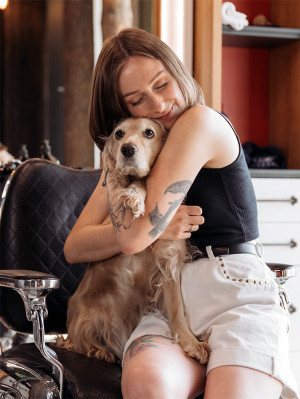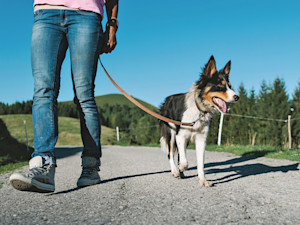Should You Be ‘Lighthouse Parenting’ Your Dog?
It’s the latest parenting buzzword, but should you apply the principles to your four-legged child?

Share Article
When we welcomed our first puppy into our young family of five, I quickly came to understand there are some similarities in raising puppies and toddlers. As a parent to both two- and four-legged children, you have to tend to their toileting needs, teach them right from wrong, give them lots of love and affection, and keep a watchful eye on their independent explorations.
As a parent, I’ve frequently heard the term ‘ lighthouse parentingopens in a new tab’ suggested as a healthy way to raise a child. Like an actual lighthouse, a parent who adopts lighthouse parenting provides a stable source of guidance for a child while allowing them freedom to learn and grow on their own. They aren’t hands-off, but they aren’t helicoptering around or micro-managing either. It’s all about being present and available when a child needs guidance, but not being over involved or overstepping boundaries.

littleKin™ is Kinship’s home just for puppy and kitten parents. Bop over to check out expert advice, new pet tools, and special deals—all curated for your newest family member.
opens in a new tabThe outcome is hopefully a child who is an independent, resilient, problem solver with a healthy relationship to their caretaker.
Could the same type of parenting be useful for pet parents of dogs?
Is lighthouse parenting for dogs a good idea?
In her many years working as an Accredited Trainer and Certified Separation Anxiety Behaviour Consultant for Pippin Pets Dog Trainingopens in a new tab, Jo Sellers hasn’t yet come across dog parents asking about or using lighthouse parenting in their training. However, the ‘vague’ term concerns her.
“It appears to ‘allow’ dog owners to be hands off with their dogs – almost to the point of being irresponsible in terms of the welfare of the dog,” she says. “Dogs do not have our linguistic skills, nor the same thoughts, desires or understanding, so it is not relevant to try and reason with your dog, to have a conversation to guide them when instead they do need clear boundaries for safety, their own, and for other people around them.”
While Sellers thinks there is value in letting your dog express choices and learn from experiences, and in allowing them to have natural behaviours, it “has to be done in a safe and managed way” so they aren’t a danger or nuisance to themselves, other dogs, or humans.
Zoe Willingham, a dog behaviourist, agrees with these concerns, saying that unlike humans, dogs don’t speak our language, so reasoning with them and teaching them about choices is more complicated than it is with kids.
“We have to remember dogs are a different species and can't understand our reasoning,” Willingham says. “Each species has different capabilities and needs and should be treated as such. In my opinion, dogs need parenting that is done with kindness with their emotional well-being at the heart of what they do, but that doesn’t mean there should not be management in place.”
For example, you wouldn’t let your dog off the lead by a busy road, give them the option to stay on the path, and hope for the best. They won’t be able to discuss with you the threats or risks of vehicles on the road.
“Guidance and management (a lead) is needed here,” Willingham says.
In the house, dogs, unlike young children, are often left for hours unattended. If left to sort their own entertainment, they may take to emptying the contents of your bin or ripping apart cushions.
They can’t just be left to explore the house, but need plenty of guidance and management from parents to ensure they are successful, safe, and not destructive when left to their own devices.
Are there aspects of lighthouse parenting that can be adopted for pet parents?
Even though lighthouse parenting for children may not be completely appropriate for pet parents, there are aspects of the parenting style that could be helpful for parenting dogs.
“We use some of the same ideas around lighthouse parenting in positive training,” Willingham says.
Studies have shown that dogs trained with positive reinforcementopens in a new tab, rather than punishment-based training like shock collars, yelling, or physical punishment, tend to experience lower levels of stress and anxiety.
“The lower stress levels promote better resilience by helping the dog cope with new or challenging situations,” Willingham explains. “As well as reducing stress and cortisol, studies have found that dogs have more stable, predictable behaviour and enhanced socialisation, as positive reinforcement strengthens desirable behaviours rather than suppressing undesirable ones through punishment.”
Although we can be sources of guidance, support, and wisdom for our dogs (all encouraged in lighthouse parenting), it looks different than with children.
“You can’t sit down with, chat to, and reason with a dog pointing out different pathways,” Willingham says. “As dog owners our wisdom would likely manifest itself as management and safety for the dog as well as training the dog to offer behaviours we would like to see.”
On the opposite end of the spectrum is micromanagement of your dogopens in a new tab. This could be detrimental as your dog might become anxious, unable to engage with their environment without their parent to instruct them.
“What owners should aim for is a healthy balance,” Sellers says. “Where it is appropriate and safe, let your dog decide which route to go, let them stop and sniff or explore. Letting them learn and think for themselves helps training to stick better, as they are thinking about what they are doing and working out if something is safe or not.”
Examples might include letting them interact with suitable dogs so they can understand communication and body language better.
But not at the expense of other animals or people, she continues.
This form of training might be totally unsuitable in some instances, like when livestock are around – that could be a fatal decision. Or perhaps if you were to leave your dog outside in the garden to make its own entertainment while disturbing the neighbours with incessant barkingopens in a new tab.
Sellers likes the aspect of lighthouse parenting that involves letting a dog problem solve.
“Problem solving can be good for a dog's mental well-being, which is why puzzle feedersopens in a new tab and activities such as scent detection can be so good for them,” she says. “Dogs are natural puzzle solvers, so doing these are meeting their needs and can help relax and settle dogs when at home.”
Will lighthouse parenting help with separation anxiety?
While parenting children with the lighthouse parenting style is meant to foster independent children who aren’t anxious to be without their parents at all times, this isn’t necessarily the case with dogs.
“We definitely cannot make assumptions that if we adopted lighthouse parenting for dogs they would suffer less with things like separation anxiety, this is because any behavioural issue with a dog has so many reasons as to why it may exist and how the dog is parented is a small part of that puzzle,” Willingham says.
Lack of early socialisation, traumatic past events, inconsistent routines, genetic factors, and lack of mental stimulation are just a handful of issues that can lead to separation anxiety – issues that won’t necessarily be solved by taking on a lighthouse parenting approach.
“Living with a dog is not like living with a human”
Although parenting my puppy and toddlers looked similar, the two forms of parenting weren’t identical.
Our dog wasn’t, and still isn’t, able to communicate or be reasoned with in exactly the same way as my human children.
“Living with a dog is not like living with a human,” says Sellers. “We cannot explain, or expect certain behaviours and think that they will comply every time.”
Even though full-on lighthouse parenting may not be appropriate, Sellers says it’s important to recognise when you can leave your dog to try new things and explore for themselves, but always with parameters and boundaries. Or it will be “chaos and even dangerous.”
“The extremes of both lighthouse parenting and micromanaging your dog can be detrimental to their mental well-being,” Sellers concludes. “So finding a healthy balance in the right scenarios is essential for a more relaxed partnership with your dog.”
Resources
China, L., Mills, D. S., & Cooper, J. J. (2020, July 3). Efficacy of dog training with and without remote electronic collars vs. a focus on positive reinforcementopens in a new tab. Frontiers.

Lauren Crosby Medlicott
Lauren is a freelance journalist who lives with her family and black labrador, Betsie, in the south Wales valleys. When she’s not working, she loves going for a dip in a nearby river and hiking in the Brecon Beacons.
Related articles
![dog and person sleeping in bed]() opens in a new tab
opens in a new tabIs Your Pup a ‘Velcro Dog’?
Is your dog overly clingy? Here’s how to help them build independence
![Person walking dog on lead]() opens in a new tab
opens in a new tabUnexpected Safety Hacks For Anxious Dog Parents
Ways to keep your dog safe that you’ve never thought of
![young man with black hair cuddling his beagle dog]() opens in a new tab
opens in a new tabLeaving Your Dog Home Alone? Here’s How to Handle the Guilt
Leaving your dog alone at home can be guilt-inducing... but it doesn’t have to be
![Curly haired woman with tattoos holding her Labradoodle dog up to her face in a tender embrace]() opens in a new tab
opens in a new tabHow Deep Is the Love For Our Dogs?
The connection between people and dogs is the stuff of legends
- opens in a new tab
How to Tell If Your Dog Is Just Playing (& When to Step In If They’re Not)
It’s all fun and games... until it’s not





